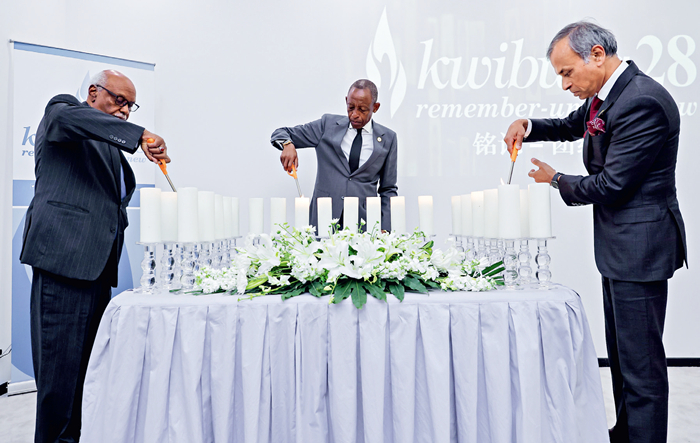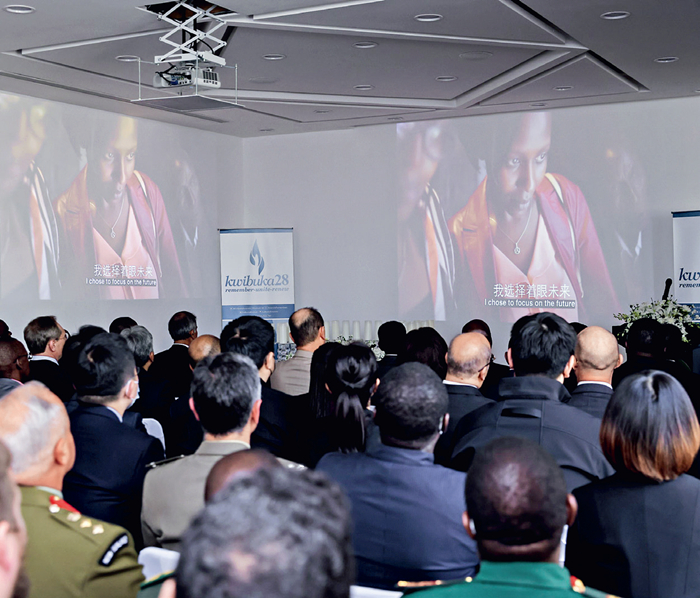|
||||||||||
| Home Nation World Business Opinion Lifestyle ChinAfrica Multimedia Columnists Documents Special Reports |
|
||||||||||
| Home Nation World Business Opinion Lifestyle ChinAfrica Multimedia Columnists Documents Special Reports |
| ChinAfrica |
| Remember, Unite, Renew |
| Rwandan community in China commemorates the 28th anniversary of the genocide against the Tutsi in 1994, reaffirming commitment to national unity |
| By Li Xiaoyu 丨VOL. 14 MAY 2022 ·2022-05-19 |

Rwanda’s Ambassador to China James Kimonyo (middle), African Union’s Permanent Representative in China Rahamtalla Mohamed Osman (left) and UN Resident Coordinator in China Siddharth Chatterjee light candles in memory of the victims during the 28th commemoration of the genocide against the Tutsi in Rwanda on April 7 in Beijing (COURTESY)
Candles are lit in memory of the victims; a minute of silence is observed as a tribute; a survivor testifies; a poem is recited by children who carry hope ... Under the theme “Remember - Unite – Renew,” the 28th annual commemoration of the genocide against the Tutsi in Rwanda was organized by the Rwandan embassy in China on April 7 in Beijing. The purpose, according to the organizer, is to remind the international community of its duty to remember, and to maintain its unity while renewing its strength to build a better future.
Remembrance
April 7, 1994 marked the beginning of a genocide against the Tutsi in Rwanda. In the 100 days that followed, more than 1 million people were systematically murdered by Hutu extremists. Speakers at the commemoration affirmed that it is critical to remember the genocide 28 years after the tragedy, or about a generation.
Siddharth Chatterjee, UN Resident Coordinator in China, said that “acknowledging the genocide in Rwanda is an act of courage and compassion.” He emphasized that “the international community joins today in solidarity with the people of Rwanda to remember and to ensure such atrocities never occur again.”
Rahamtalla Mohamed Osman, African Union’s Permanent Representative in China, appealed for unity in the fight against genocide, so that history does not repeat itself, either in Africa or elsewhere in the world.
Rwanda’s Ambassador to China James Kimonyo agreed, emphasizing the necessity for legislation to penalize denial and trivialization of the massacre. He insisted that offenders still on the run in various parts of the world should be brought to justice in Rwanda, or at least in their respective jurisdictions. “We want to make sure the countries understand the danger of allowing this culture of impunity to exist endlessly and that it doesn’t become the basis of another cycle of genocide,” he told ChinAfrica.
The Rwandan Government, according to the ambassador, is aiming to incorporate genocide education in the national school curriculum in order to educate young people about hateful content and empower them to speak out against it. Simultaneously, public conferences are held on a regular basis to increase awareness of the causes and repercussions of such crimes among current and future generations, as well as to develop their resistance to all sorts of prejudice. “That’s a continuous kind of endeavor that will ensure that you have a generation that thinks about humanity,” said the ambassador.

The participants watch a documentary about the genocide during the commemoration on April 7 in Beijing (COURTESY)
Unity
In Rwanda, reconciliation is not an empty word. In its name, countless survivors have forgiven their tormentors. “The survivors really look at the big picture of building a new country,” said the ambassador.
While many of them are still traumatized, some are attempting to reconcile with themselves. Consolee Nishimwe’s case is an example of this. She was raped and infected with HIV at the age of 14 during the genocide. After suffering physical and emotional torture during three months in hiding, she amazingly survived with her mother and younger sister. Her father and three younger brothers, on the other hand, were not so fortunate.
She ultimately chose, nine years after the atrocity, to chronicle her story in her memoir Tested to the Limit: A Genocide Survivor’s Story of Pain, Resilience, and Hope, to liberate herself from the psychological pain and grief. Now a committed genocide-survivor speaker and advocate for women’s and survivors’ rights, Nishimwe feels relieved to be able to educate young people about the history of the genocide through her testimony. “I survived for a reason,” she insisted. “There’s a mantra that I live with. No matter what horrible circumstances you may face in your life, never lose hope, for losing hope is the beginning of your own self-defeat.”
Despite the country’s meager financial resources following the genocide, the Rwandan Government did not stay insensitive or passive in the face of the survivors’ suffering. It has provided them with some important tools to assist them in emerging from the shadows of the past. For example, the Genocide Survivors Support and Assistance Fund has been established to support vulnerable people who are survivors of genocide with education, health care, housing, social assistance and income generation. “But it’s not only about material aid,” the ambassador told ChinAfrica. “It has to also be about the moral, psychological and social support to them. There has been really tremendous support directly with the government, and through so many other organizations.”
Renewal
UN Secretary-General António Guterres congratulated Rwanda on rising from the ashes, in his message to a commemoration at the UN Headquarters. “Rwanda today stands as a powerful testament of the human spirit’s ability to heal even the deepest wounds and emerge from the darkest depths to rebuild a stronger society.” He pointed out that after having suffered unspeakable gender-based violence and discrimination, Rwandan women today hold 60 percent of parliamentary seats. Rwanda, he added, is the fourth-largest contributor to UN peacekeeping operations, “risking their own soldiers to spare others the pain they themselves have known.”
It is clear that Rwandan society, which was tearing itself apart only a generation ago in one of history’s most horrific instances of division, is now working hard toward a common goal. President Paul Kagame, who has been in office since 2000, has led the country to make significant progress in a variety of sectors, ranging from Internet access to health care, during the last two decades. According to the World Bank’s ranking, it is Africa’s second-most business-friendly country, after Mauritius. Rwanda is pushing on with Vision 2050, which sets out goals to make Rwanda a middle-income country by 2035 and a high-income country by 2050, after successfully completing Vision 2020.
In addition to visionary leadership and the resilience of its people, Rwanda’s successful transition to development is also inseparable from international cooperation, according to the ambassador. The diplomat highlighted China’s engagement with Rwanda and Africa. “Its contribution in many different sectors for me is the basis of the sustainable growth and prosperity of African countries,” he said. Being well aware of the issue of national security, he appreciated China’s proposition and endeavor to build a community with a shared future for mankind.
|
||||||||||||
| About Us | Contact Us | Advertise with Us | Subscribe |
| Copyright Beijing Review All rights reserved 京ICP备08005356号-5 京公网安备110102005860号 |